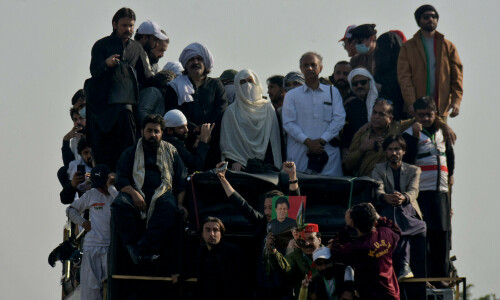UN General Assembly session and President Musharraf’s visit are being covered jointly by Dawn’s correspondents Masood Haider, Anwar Iqbal and Qudssia Akhlaque
UNITED NATIONS, Sept 19: President Pervez Musharraf told the UN General Assembly on Tuesday that an acceptable solution of the Kashmir dispute was “within reach” as a result of the peace process between India and Pakistan.
“I am confident that my positive meeting with Prime Minister Manmohan Singh in Havana will help to carry forward the peace process which is vital for the future of both countries and for peace in South Asia and beyond,” he told the 192-member Assembly.
In his wide-ranging speech, the president also outlined his views on issues like the “war on terror”, Afghanistan, Iraq, Lebanon, the nuclear issue, UN reform and global development.
There is, however, one issue on which there appeared to be a marked difference in the president’s approach this year: the Arab-Israeli conflict. Unlike last year, there were no ‘chanced’ handshakes with Israeli leaders, no speeches were made at Jewish congregations, and no talk of reaching out to Israel.
Instead, he denounced the recent “Israeli aggression” against Lebanon. “We hope that the resolution painstakingly brokered in the Security Council will lead to rapid and complete Israeli withdrawal and restoration of Lebanon’s sovereignty over its entire territory,” he said.
“The attack on Lebanon has far-reaching implications for the Middle East,” the president said. “The ability and relevance of the moderate forces to bring about a just peace in the region has been put to a severe test.”
In a passionate appeal to world leaders, he said: “It is time to end Israel’s conflicts with all its neighbours. It is time, first and foremost, to end the tragedy of Palestine.
“There is no doubt in our mind that this is the core of the challenge, not only to overcome the Iraq and Afghanistan problems, but also to deal with the menace of terrorism and extremism.”
He said: “While we confront terrorism, our strategy must seek to eliminate this phenomenon comprehensively.”
Across the Muslim world, he said, old conflicts and new campaigns of military intervention have spawned a deep sense of desperation and injustice.
“Each new battleground involving an Islamic state has served as a new breeding ground for extremists and terrorists. Indiscriminate bombings, civilian casualties, torture, human rights abuses, racial slurs and discrimination only add to the challenge of defeating terrorism.”
He said his government’s strategic aim was to utilise Pakistan’s unique geo-strategic position to build trade, energy and communication corridors linking South Asia, West Asia, Central Asia and China.
AFGHANISTAN: President Musharraf told world leaders that the resurgence of the Taliban in Afghanistan also threatened Pakistan’s efforts to fight extremism at home. That is why, he said, Pakistan was willing to help this strife-torn neighbouring country that confronts complex security, political and economic challenges.
“Problems along the bordering regions of Pakistan and Afghanistan are compounded by the continuing presence of over three million Afghan refugees, some of them sympathetic to the Taliban,” he said.
“The incentives offered to the refugees for their voluntary return by the international community are minimal. A serious international commitment is required to facilitate their repatriation.”
President Musharraf also said that the confrontation over Iran’s nuclear programme threatens further instability in this already inflamed region. “We are encouraged by the Iran and 5+1 negotiations and believe that this issue can be resolved peacefully in a manner that accommodates the legitimate rights and interests of all parties,” he said. “Resort to coercion and, worse, the use of force could lead to grave consequences, regional and global.” Pakistan calls for ban on ‘defamation of Islam’ in veiled attack on pope
AFP ADDS: President Pervez Musharraf called for a ban on the “defamation of Islam” by taking a veiled swipe at Pope Benedict XVI for his remarks linking the Muslim faith to violence.
He said: “We also need to bridge, through dialogue and understanding, the growing divide between the Islamic and Western worlds. It is imperative to end racial and religious discrimination against Muslims and to prohibit the defamation of Islam.”
In an indirect reference to Pope Benedict XVI, he added: “It is most disappointing to see personalities of high standing oblivious of Muslim sensitivities at these critical moments.”














































Dear visitor, the comments section is undergoing an overhaul and will return soon.